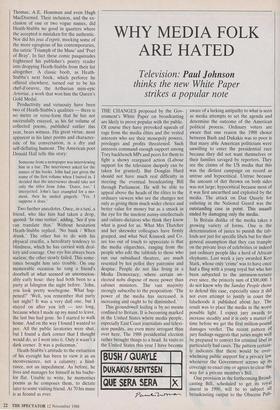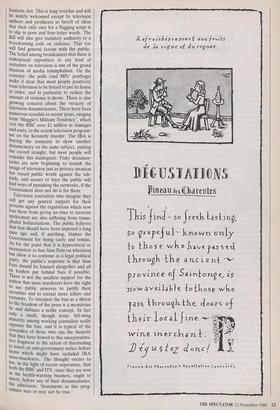WHY MEDIA FOLK ARE HATED
Television: Paul Johnson
thinks the new White Paper strikes a popular note
THE CHANGES proposed by the Gov- ernment's White Paper on broadcasting are likely to prove popular with the public. Of course they have provoked squeals of rage from the media elites and the vested interests who see their monopoly powers, privileges and profits threatened. Such interests command enough support among Tory backbench MPs and peers for them to fight a showy rearguard action (Labour support for the television duopoly can be taken for granted). But Douglas Hurd should not have much real difficulty in steering the eventual broadcasting Bill through Parliament. He will be able to appeal above the heads of the elites to the ordinary viewers who see the changes not only as giving them much wider choice and better value for money but as a smack in the eye for the insolent nanny-intellectuals and culture-dictators who think they know what is good for us. What Mrs Thatcher and her shrewder colleagues have firmly grasped, and what Neil Kinnock and Co. are too out of touch to appreciate is that the media oligarchies, ranging from the people who edit the tabloids to those who run our subsidised theatres, are much resented by hoi polloi they patronise and despise. People do not like living in a Media Democracy, where certain un- elected nobs dispose of more power than cabinet ministers. The vast majority strongly subscribe to the proposition: 'The power of the media has increased, is increasing and ought to be diminished.'
This groundswell feeling is by no means confined to Britain. It is becoming marked in the United States where media people, especially East Coast journalists and televi- sion pundits, are even more arrogant than over here. The 1988 presidential election rather brought things to a head. In visits to the United States this year I have become
BUSH / QUAYLE ' DUKAKIS/ BENTSEN
1
QUE SERA SERA
aware of a lurking antipathy to what is seen as media attempts to set the agenda and determine the outcome of the American political process. Ordinary voters are aware that one reason the 1988 choice between Bush and Dukakis was so poor is that many able American politicians were unwilling to enter the presidential race because .they did not want themselves or their families savaged by reporters. They see the claims of the US media that this was the dirtiest campaign on record as untrue and hypocritical. Untrue because the amount of dirt thrown on both sides was not large; hypocritical because most of it was first unearthed and exploited by the media. The attack on Dan Quayle for enlisting in the National Guard was the outstanding case in point. This assault ended by damaging only the media.
In Britain dislike of the media takes a growing variety of forms. One is the determination of juries to punish the tab- loids not just for specific libels but for their general assumption that they can trample on the private lives of celebrities or indeed just ordinary people like a herd of African elephants. Last week a jury awarded Koo Stark, whose only 'crime' was to have once had a fling with a young royal but who has been subjected to the intrusion-torture ever since, the princely sum of 000,000. I do not know why the Sunday People chose to defend this case, especially since it did not even attempt to justify in court the falsehoods it published about her. The result was to place the media in the worst possible light. I expect jury awards to increase steadily and it is only a matter of time before we get the first million-pound damages verdict. The recent pattern of jury findings suggests that juries might well be prepared to convict for criminal libel in particularly bad cases. The pattern certain- ly indicates that there would be over- whelming public support for a privacy law whenever the Government screws up its coverage to enact one or agrees to clear the way for a private member's Bill. One provision in the forthcoming Broad- casting Bill, scheduled to get its royal assent in 1990, will be to subject all broadcasting output to the Obscene Pub-
lications Act. This is long overdue and will be widely welcomed except by television authors and producers so bereft of ideas that their only cure for a flagging script is to slip in porn and four-letter words. The Bill will also give statutory authority to a broadcasting code on violence. That too Will find general favour with the public. The belief among broadcasters that there is widespread opposition to any kind of restraints on television is one of the grand illusions of media triumphalism. On the contrary: the polls (and MPs' postbags) make it clear that most people positively want television to be forced to put its house in order, and in particular to reduce the amount of violence it shows. There is also growing concern about the veracity of television documentaries. There have been numerous scandals in recent years, ranging from `Maggie's Militant Tendency', which cost the BBC over £1 million in damages and costs, to the recent television program- me on the Kennedy murder. The IBA is forcing the company to show another documentary on the same subject, putting the record straight, but most people will Consider this inadequate. Fishy documen- taries are now beginning to tarnish the image of television just as privacy-invasion has raised public wrath against the tab- loids, and sooner or later the public will find ways of punishing the networks, if the Government does not do it for them.
Television journalists who imagine they Will get any general support for their Protests against the regulations which now ban them from giving air-time to terrorist Spokesmen are also suffering from trium- phalist hallucinations. The public believes that ban should have been imposed a long time ago and, if anything, blames the Government for being tardy and remiss. As for the point that it is hypocritical or inconsistent to ban Sinn Fein on television but allow it to continue as a legal political Party, the public's response is that Sinn Fein should be banned altogether and all its leaders put behind bars if possible. There is not the smallest support for the notion that mass murderers have the right to use public airwaves to justify their atrocities and to recruit more killers and torturers. To interpret the ban as a threat to the freedom of the press is a monstrous lie and debases a noble concept. In fact only a small, though noisy, left-wing minority among working journalists really oPposes the ban, and it is typical of the Cowardice of those who run the duopoly that they have bowed to this unrepresenta- tive fragment to the extent of threatening tO Insert an anti-government notice before items which might have included IRA mass:murderers. The thought occurs to me, in the light of recent experience, that both the BBC and ITV, since they are now in the health-warning business, ought to insert, before any of their documentaries, the admission: 'Statements in this prog- ramme may or may not be true.'











































































 Previous page
Previous page